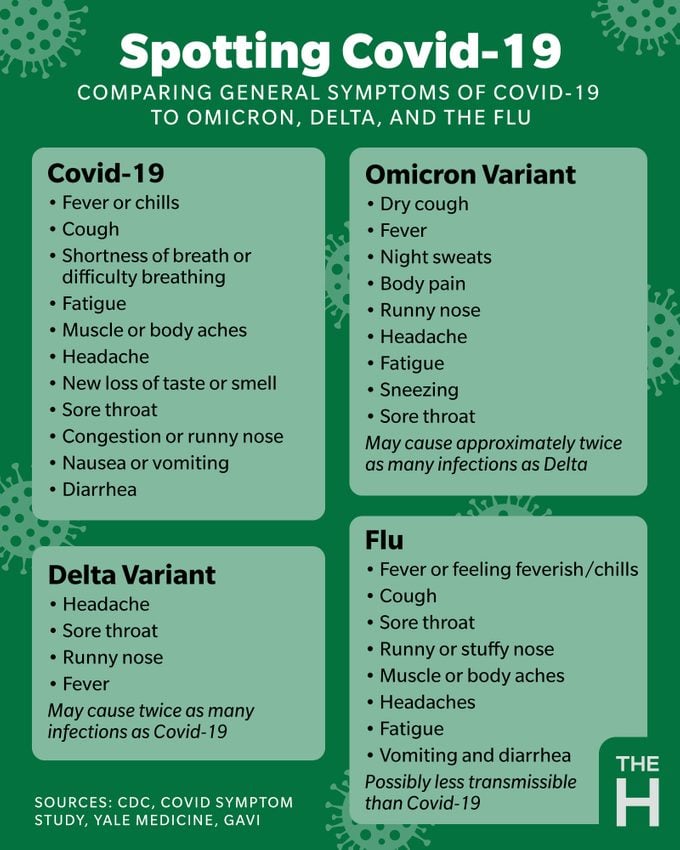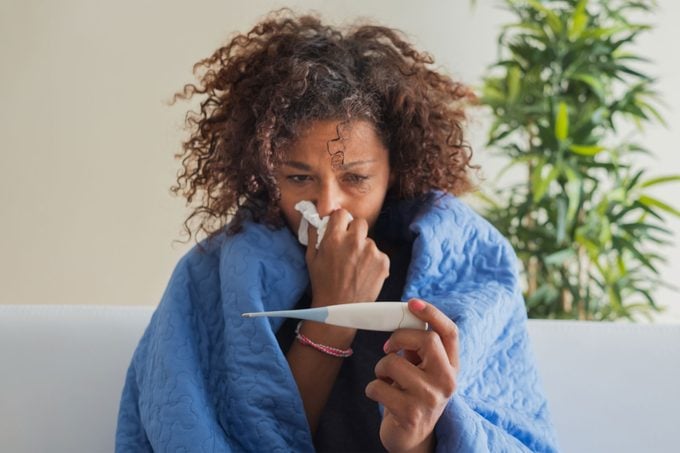Do You Have “Flurona”? Here’s the Only Way To Know, an Infections Expert Says
Updated: Mar. 16, 2022
"The big question is whether flurona is deadlier than either illness alone," this UCLA infectious disease specialist says. Find out what puts you at greatest risk for this dreaded flu and Covid-19 duo.
Flu + Covid-19 = “Flurona”
Flurona is a phrase that’s currently trending to describe the (rather unfortunate) experience of being infected with Covid-19 and the flu at the same time. “The flu activity in the U.S. is high right now,” says Matthew B. Laurens, MD, a professor of pediatrics at the University of Maryland School of Medicine in Baltimore. Laurens is one of many health professionals who projects flurona will only gain momentum as Coronavirus winter progresses. “With the current wave of [the] Omicron Covid-19 variant,” this doctor says, “I think flurona will be more common this year than last year.”
Public health officials have been braced for a “flurona” type of phenomenon since last winter, when many infectious disease experts warned of a possible “twindemic” of flu and Covid-19. Thanks to vigilant Covid-19 prevention strategies, that didn’t happen. “There are about 40,000 deaths from the flu each year, but because of efforts to slow Covid-19’s spread with masking, social distancing, and school closures, the flu was almost stopped in its tracks last winter,” says Otto Yang, MD, an infectious disease expert at UCLA Health.
This year’s been different. The first cases of flurona were confirmed in Israel in early January 2022, and cases in the United States are rising. As some Americans have let their guards (and masks) down, many schools are open, and Omicron is way more contagious than earlier Covid-19 variants, we’ve got a perfect stage set for flurona to flourish, Dr. Yang says.
“The big question is whether flurona is deadlier than either illness alone, and this is not entirely clear yet,” says Dr. Yang. “It is probably worse to have them together, but we really don’t know at this point.”
How flurona can happen
The flu and Covid-19 aren’t linked, they just can occur at the same time in the same person. “Picture a Venn diagram where circles overlap, and that overlap is flurona,” says Dr. Yang.
It makes sense that these two upper respiratory infections travel together, since they seem to share the same seasonality. Flu season spans fall and winter, and this is prime time for Covid-19, respiratory syncytial virus (RSV), and several other viruses, too.
But together, the flu and Covid-19 combine to create a unique set of threats. These two viruses share many symptoms, are spread through respiratory droplets passed when coughing, sneezing, speaking, singing, or breathing, and importantly, are preventable with the same measures. Both infections also seem to be more common in healthcare workers, the elderly, and folks with underlying health conditions.
Flu symptoms
Flu symptoms can range from mild to severe, according to the Centers for Disease Control and Prevention (CDC). Flu symptoms may include:
- Fever
- Chills
- Cough
- Sore throat
- Runny nose
- Congestion
- Body aches
- Headaches
- Tiredness
The flu usually comes on suddenly, says Len Horovitz, MD, a pulmonary specialist with Lenox Hill Hospital in New York City. Dr. Horovitz adds: “Covid-19 has more of a progressive onset.” (Here are seven times you may think you have the flu—but don’t.)

Covid-19 symptoms
Covid-19 has a lengthy list of possible symptoms. Like flu symptoms, Covid-19 symptoms run the gamut from mild to severe.
Possible Covid-19 symptoms include:
- Fever
- Chills
- Cough
- Difficulty breathing
- Tiredness
- Body aches
- Headache
- New-onset loss of taste or smell
- Sore throat
- Congestion
- Runny nose
- Nausea
- Vomiting
- Diarrhea
Covid-19 symptoms may appear two to 14 days after you’ve been exposed to the virus, according to the CDC.
While Omicron appears to be causing milder illness than older Covid-19 variants, you can still spike a fever with this variant, Dr. Horovitz says.
“Do I have flurona?”
Infectious disease specialist Dr. Yang says the overlap of the symptoms between the flu and Covid-19 is so high that it is almost impossible to tell if you have one or both based on how you feel. The only way to know what is ailing you is to get tested. “If you get a Covid-19 test in a medical center, they may also test for the flu using the same nasal swab.” However, he warns, “[…T]his is not the case at pop-up Covid-19 testing centers.”
There are several Food and Drug Administration (FDA)-authorized Covid-19 at-home tests, but Dr. Yang says there are no reliable home tests for the flu.
“Now we are testing for flu and Covid-19 in adults and flu, Covid-19, and RSV in children using the same sample,” says Daniel Rhoads, MD, the section head of microbiology at Cleveland Clinic.
How serious can flurona be? Potentially, very. “You can probably get all three illnesses at the same time,” Dr. Rhoads says. “It not uncommon to find multiple respiratory viruses in [one patient].” This is more common in people who have weakened immune systems.
Dr. Laurens advises that even if you have gotten the flu shot and are fully vaccinated and boosted against Covid-19, get tested if you have symptoms. “Breakthrough cases can occur with the flu or Covid-19.”

How to treat flurona
Suppose you test positive for the flu, Covid-19, or both. In that case, there are treatments available to shorten the duration, reduce the severity of your symptoms, and lower your chances of needing to be hospitalized.
The four antiviral drugs that are FDA-approved for both flu prevention and treatment are:
- Oseltamivir phosphate (available as a generic or as Tamiflu)
- Zanamivir (Relenza)
- Peramivir (Rapivab)
- Baloxavir marboxil (Xofluza)
There are also now two antivirals with emergency use authorization from the FDA to treat Covid-19—those are Paxlovid and Molnupiravir. These are prescription-only and reserved for people with mild-to-moderate Covid-19 who are at high risk for severe illness, hospitalization, or dying. They aren’t widely available yet, and their rollout varies from state to state.
There are also three anti-SARS-CoV-2 monoclonal antibody treatments that the FDA has authorized for emergency use, adds Dr. Horovitz. These are man-made molecules that act as a substitute for natural antibodies and help your immune system fend off Covid-19.
They’re not for everyone, he says. Given by infusion, monoclonal antibody treatments are reserved for people at risk for severe Covid-19. “We are reserving treatments for people at really high risk due to a weakened immune system or other health problems where it worth pulling them into an infusion center,” says Dr. Horovitz.
Dr. Yang says if you are eligible for Covid-19 antivirals or monoclonal antibodies, you can take these at the same time as flu drugs if you have flurona.
Preventing flurona
The good news is that many of the same things we do to prevent Covid-19 will work against the flu and even flurona, experts say. This includes wearing masks when you’re inside public spaces and places and practicing social distancing. (This is why you still need to wear a mask indoors if you’re vaccinated.)
Hand washing is also important, says Dr. Laurens.
Soap and water are the preferred handwashing method, but hand sanitizers containing at least 60 percent alcohol can be a good substitute if you don’t have access to a sink. (By the way, here are 7 things that can happen when you don’t wash your hands.)
Wash your hands for at least 20 seconds before, during, and after preparing food or eating, caring for someone at home who is sick, or treating a cut or wound. Also, lather up after going to the bathroom, changing diapers, blowing your nose, coughing, or sneezing, stresses the CDC.
Importantly, it’s not too late to get vaccinated against the flu or Covid-19. “Get vaccinated and/or boosted and encourage your friends and loved ones to do the same,” Dr. Laurens says. And yes, you can get your covid vaccine and flu shot on the same day. These vaccines can prevent serious illness.
Learn more in 9 Things to Know About Covid Vaccine Booster Side Effects. If you’re making efforts to be your healthiest this year, don’t miss 10 Easy Self-Care Swaps to Make in 2022.



